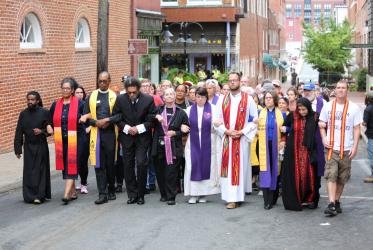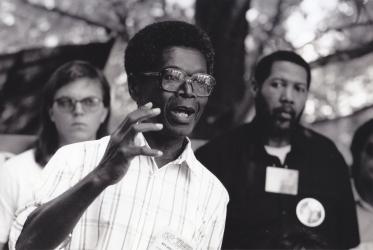In a lively online discussion entitled “Breaking Down the Walls,” the Northeast American Diocese of the Malankara Orthodox Syrian Church explored the racial injustices in our society, how racism plays a role in the Indian American community, and what Orthodox Christians can do.
Sunil Kurian, an attorney who resides in Philadelphia (USA) moderated the discussion, saying: “These are troubling times. We as Orthodox Christians must break down the walls of racism that separate us.”
Metropolitan Zachariah Mar Nicholovos, a member of the World Council of Churches Executive Committee, offered some reflections on his thoughts as he wrote a “Statement Regarding the Death of George Floyd.”
Why did he feel it was necessary for the dioceses to speak out? "It was a sad incident to say the least,” said Nicholovos. “When you look at the incident, when you see the police officer to whom we all look at to protect us—when he acted in a very gross manner and his colleagues looked on without taking an action, it was a gross injustice.”
As a religious leader, Nicholovos said he felt he had to make a statement “because I felt as a disciple of Christ I am called to do that.”
The statement also speaks of “the reality of racism,” and Nicholovos said nobody is a bystander. “The whole system is lopsided toward a so-called ruling class,” he said.
Kurian said the Northeast American Diocese of the Malankara Orthodox Syrian Church
has seen a unique outpouring from the young people in the church. He asked Nicholovos what it means to have “the courage to act.”
Kurian’s parents came to the US in the 1970s, and now his own children are the third generation.
Nicholovos said acting could include writing a letter to your senator and supporting organizations that work for justice, among many other actions.
“We cannot afford to be a bystander, to have a neutral position,” he said. “We should have a preferential position toward the oppressed. We are called to be with the oppressed. The courage to act doesn’t come free. It is a costly courage.”
“A peaceful, just society for future generations is really important,” said Nicholovos. “Different generations might look at those things differently.”
The conversation, he added, should be about how to create a wider just society to live in. “We have to understand only a just society will be able to provide that sense of peace and harmony for all of us,” he said.
What can people do in their own households? How do you have the important conversations?
Nicholovos said it’s vitally important to keep the conversation going. “Young people, don’t let your passion die,” he said. “At the same time, parents are worried for their children’s safety. They don't want you to be the next George Floyd. There’s no easy answer because the people who don’t share your passion are informed differently."
Northeast American Diocese of the Malankara Orthodox Syrian Church







